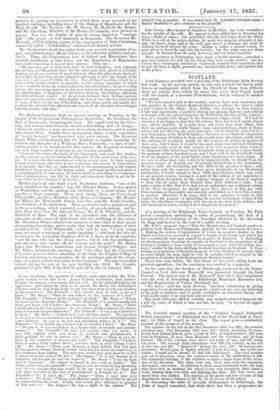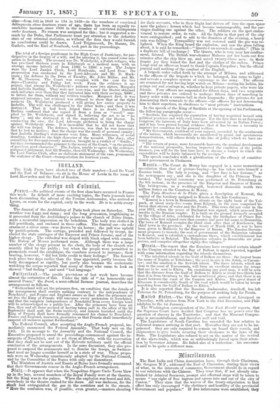SCOTLAND.
Lord Pammire presided over a meeting of the Edinburgh Bible Society last week. In his opening speech, he not only pointed out that in addition to an undisguised attack from the Church of Rome from without, there arc attacks from within by many who cover their Popish hearts with the mantle of a spurious Protestantism, but he referred to another movement.
"We have heard a talk in the country, and we have seen absolutely put into practice in the United States of America, a scheme for what is called a new version of the Bible. Now, feeling very strongly on that subject, I take this opportunity of publicly stating my opinion, that any such scheme is fraught with the utmost danger to the Protestant liberties of this country ; nay, it is fraught with danger to the Protestant religion itself. If I look to America, I am happy to find that the scheme there has been I might almost say, utterly abortive. It is quite true, and every man must admit, that there are perhaps some slight things—some mistranslations, slight in themselves, and not affecting any great principle—which might be corrected in a new translation of the Holy Scriptures; but they are so slight in comparison with the danger of letting in those who would make alterations, partly from the criticism of erudition, partly for the purpose of getting in dogmas of their own, that I think it would be the most dangerous and most disastrous thing that could occur to this couutry if we were to permit those words to be tampered with which have been household words in many a pious family for upwards of three hundred years, and I hope will be the household words of all the families of the world before three hundred years more elapse. If we were to allow those holy words to be tampered with, we should be in the greatest danger of shaking our Protestant institutions to the foundation. We have some old landmarks, and the Bible is the greatest of these ; and, rather than risk the removal of these great landmarks of our Protestant institutions, I would submit to those little imperfections whioh may exist in our present version, leaving it as part of the calling of our ministers to study the Holy Scriptures in the original tongues, to lit them to explain to those who sit under them wherein those little differences exist. I am quite certain of this, that if we had not an authorized and confirmed version of the Holy Scriptures, we should never have arrived at this day with Protestantism so thoroughly and stanchly established as it is in this country at present. Therefore I do hope, that if any agitation is made in this country for the purpose of disturbing the present authorized version of the Bible, the Christian community will rise up as one man in its defence, and will maintain it intact, seeing it is so dangerous to touch it."
At a meeting of the Edinburgh Town-Council, on Tuesday, Mr. Fyfe moved a resolution embodying a series of propositions, the fruit of a movement for an extension of the franchise initiated by the Reverend Dr. Begg and backed by the vote of a public meeting.
Mr. Fyfe's proposal was—" That the Magistrates and Council resolve to petition both Houses of Parliament, praying for the enactment of a law-I. Making the system of registration of voters in counties similar to that which was last year enacted in regard to burghs in Scotland, and which has for a censiderable time past existed in counties in England. 2. Extending the Parliamentary franchise in counties in Scotland to the proprietors of all heritages yielding a clear rental of two pounds a year, (after deducting feuduty,) similar to the forty-shillings freehold franchise in England. 3. Cona terrine on proprietors of freehold property of forty shillings of annual value in royal burghs the same right to vote in counties which is enjoyed by the proprietors of similar freehold property in English burghs."
There was some debate, the last clause of the series calling forth the greatest opposition ; but the resolution was carried by a majority.
On the same day, the freedom of Edinburgh, conferred by the TownCouncil on Lord Advocate Moncreiff, was presented through the Lord Provost. The special acts of Mr. Moncreiff that led to this compliment were his zeal in forwarding the Edinburgh Municipal Extension Act, and the Registration of Voters' (Scotland) Act. "We have," said the Lord Provost, "peculiar satisfaction in giving expression to our gratitude and esteem for a native of our own city following in the path of eminence and of public usefulness an honoured lineage who lived in the midst of us respected and revered."
The Lord Advocate offered suitable and modest acknowledgments for a gift the value of which to him and his, he said., "is beyond all appredation."
The eleventh annual meeting of the "Original Ragged Industrial School Association" of Edinburgh was held in the Music-hall on Tuesday; the Duke of Argyll in the chair. The report gave a satisfactory account of the progress of the society.
The 'limber on the roll on the 31st December 1855 was 302; the number admitted since 31st December 1855 was 110; which, including 19 transferred from Infant School, gave a total of 431; of which number, 376 were born in Scotland, 12 were from England and the Colonies, and 43 from Ireland : 191 of the scholars were above ten years of age, and 237 under ten years. The average daily attendance was 228, the number on the roll at this date was 247. " Removed " during the year, 165: 45 had got employment; 39 had gone to higher schools ; 5 bad deserted, and would not return ; 5 could not be found ; 17 had left Edinburgh. The total number sent out to situations since -the commencement of the institutions is 434. The industrial training of the children occupies a large share of the attention of the directors. The older boys take their turn with the carpenter, shoemaker, and tailor. In addition to their usual industrial work, the boys take their turn in washing the school-rooms and dormitory three times a week, making their own beds, and lighting the fires. The boys make ami raeiad their own clothes. The abstract of the profit and loss account of this department shows a balance of 18/. 88. 7d. in favour of the school.
In discussing the state of juvenile delinquency in Edinburgh, the Duke of Argyll remarked, that while there has been a progressive de
cline—from 552 in 1848 to 134 in 1856—in the numbers of convicted delinquents above fourteen years of age, there has been an equally remarkable increase since 1850 in the number of convicted delinquents envier fourteen. No reason was assigned for this ; but it suggested a remark by the Duke, that Parliament must pay attention to the defective state of our -criminal statistics, as without the data they would furnish no conclusions could be drawn. Lord Teig,nmouth, Dr. Hanna, Dr. Guthrie, and the Earl of Southesk, took part in the proceedings.
The trial of a foreign gentleman in the High Court of Justiciary, for participation in the forgery of a will, and for uttering it, has caused some sensation in Scotland. The accused was Dr. Weilobyeki, a Polish refugee, who has practised thirteen years in Edinburgh as a medical man, with an average income latterly of from 1100/. to 1200/. a veer. The Judges were the Lord Justice Clerk, Lord Handvside, and Lord Dees: the prosecution was conducted by the Lord-Advocate and Mr. D. Mackenzie,the defence by the Dean of Faculty, Mr. John Millar, and Mr. W. II. Thomson. The Court was occupied with the case for two days—Thursday and Friday last week. From the evidence it appeared, that among Dr. Weifobycki's patients were two sisters, Margaret and Isabella Darling. They were not over-wise, and the Doctor obtained such influence over them that they intrusted him with their sayings, 3000/., to invest for them, without any written voucher. Margaret died, it was supposed intestate ; but evidence was adduced to show that at the right moment Dr. Weilobycki produced a will giving her entire property to Isabella. The will was challenged.by the other heirs ; and then it was destroyed. That it had been forged there is no doubt. Isabella Darling confessed that she copied it from a form or "scroll" supplied by Dr. Weilobycki, and signed it, believing the net to be "no harm" ; and she destroyed it at the suggestion of the Doctor. In cmductin s: the ease, the Lord Advocate preferred to bring the charge q. against It eilobycki alone. It is incredible that he did not know that the will was forged. The defence, however, was that he was innocent ; that he had no motive ; that the charge was the result of personal enmity; that Isabella Darling's statements were false. Many witnesses, of social standing, testified to the high character of the accused. The Jury, after consulting for five-and-twenty minutes, brought in a verdict of "Guilty," but they recommended the prisoner to the mercy of the Court, "on the ground of previous good character." The Judges, unable to agree on the sentence, postponed judgment, first till Monday, then till Wednesday. On Wednesday, the Lord justice Clerk, after an elaborate statement of the case, pronounced the sentence of the Court—transportation for fourteen years.



























 Previous page
Previous page